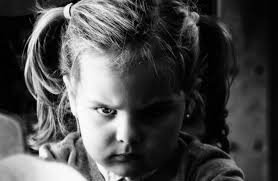The main feature of this type of disorders is opponent behavior, naughty and the child sees the representing authority as an enemy. The children quickly gets angry, arguing with adults, actively oppose the rules, blaming others for their own mistakes, are impulsive and irritable. These behaviors are evident close relationship with adults or with children the same age. Studies show that children with bleeding disorders and deficits are opposing the school performance, which is explained by their tendency to not fulfill school duties.
The criteria of conduct disorder social behavior type opponent (ICD-10) and oppositional defiant disorder (DSM-IV) are:
Has unusually frequent bouts of anger or intense (annoyed quickly);
arguing with adults often;
often times actively oppose instructions or rules of adults or refuse to follow;
it often is assaulting others intentionally;
blames others for their own mistakes or misbehavior;
It is often irritable or angry easily let others;
It is often irritable and resentful;
It is often spiteful or vindictive.
The diagnosis of conduct disorder type opponent should be considered only where the patterns of behavior shows a high frequency of occurrence and consequences of scale compared to those seen in typical children of the same age and where are areas affected family, social or school.
Symptoms associated with this behavior are:
- problems of interaction with children: they avoid requirements, violating rules in children of the same age group;
- aggressive, antisocial behavior disorder that can develop in adolescence;
- hyperkinetic disorders;
- deficits in the school performance;
- emotional disorders, especially depression.
Opponent behavior disorders begins in early childhood, with strong bouts of anger, negativity and refusal; adolescence, about half of these children's problems can disappear and the rest will develop antisocial behavior.
To school age or later, these children are shunned by peers and while they are at high risk of having school failure. The main cause of this type of behavior refers inconsistent education and low level of parental control. The aggressive behavior of children correlates with certain family characteristics, such as low income, low education level of parents and lack of social support from the community.
In opponent behavior therapy it will use child-centered approaches, aimed at reducing disorders opposing and family-centered approaches, in order to change the conditions that keep symptoms child family.
Effective therapy made with the parents of these children has been shown by studies with children aged between three and eight years.
Because this type of condition will affect many areas of life, it requires a multimodality therapy that combines several forms of intervention.
Ludotherapy is one of them, and it is my favorite for the little ones.
